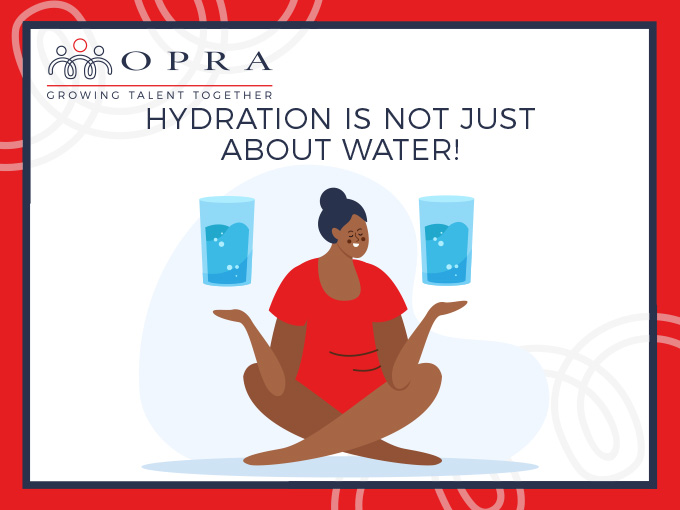Our wellbeing experts give us insight into health and wellness that we may not think about. We all know we need to drink more water, but do we really understand the impact of not enough, do we know if there are better types of drinks, and what should we drink to keep ourselves and our staff well, cognitive and working productivity as we work out more or temperatures rise?
Here’s advice from our wellbeing expert, Donald Gordon, who has guided our teams though many informative workshops, where we have learned new things and ultimately felt better!
Staying well hydrated during the warmer months, exercise, or whilst fasting, can be quite challenging for most people. It is important to recognise hydration isn’t just about water, fluid loss via other means as well as sweating, involves the loss of electrolyte minerals. There are many reasons why replacement of these minerals via an electrolyte mineral-containing drink may be better than drinking pure water alone.
Drinks containing electrolyte minerals, particularly sodium, are known to stimulate thirst, thereby stimulating a greater voluntary intake of fluid. There is also evidence that drinks containing sodium stimulate the rate and completeness of re-hydration after a bout of exercise. Truth is some people perspire more than others, although the amounts lost in sweat are generally in proportion to total body stores, however, prolonged heavy sweating can lead to significant mineral losses (particularly sodium), which can cause cramping or dizziness.
Electrolytes serve three general functions in the body:
• They control osmosis of water between body compartments
• Many are essential minerals
• They help maintain the acid-base balance required for normal cellular activities
Drinking pure water effectively dilutes the concentration of electrolyte minerals in the blood, which can impair a number of physiological processes. When it comes to fasting, such as a prolonged fast of more than 3 days, you are reducing your food intake therefore also reducing your mineral intake by up to 40%. Donald advised us ‘Coconut water is a great natural electrolyte which has a unique taste and tropical flavour but has a low sugar content’.
Brain Power: Electrolytes + Water
Cognitive performance is intimately linked to hydration status, even as little as 1-2% drop in hydration can lead to feelings associated with brain fog, such as headaches, tiredness, and poor concentration. In fact, when the body becomes dehydrated, the physiological processes that occur are the same as the ones used when coping with stress, meaning adrenaline and cortisol are released. When the body is dehydrated, the levels of energy that can be generated are decreased.
Quantity
Many sources tell us we should be drinking 8 glasses of water a day, but in truth it is not scientifically proven. To be more accurate you need to assess different body types, environments, seasons and lifestyles, this would result in considerable variations.
It is impossible to cater for everyone, ultimately your intake may depend upon whether you are on a keto diet, which is more dehydrating, experiencing a hot climate, you are engaging in vigorous exercise or fasting. These will all will require an increased uptake. One simple guide is a urine colour check, if your pee is clear, light yellow that’s ideal, if it’s dark yellow, you’re probably not drinking enough.
Timing
Hydration is significant for your quality of sleep. If you forget to drink enough during the day, you can end up trying to play catch-up too late. This often leads to multiple visits to the bathroom during the night, not helpful for good, uninterrupted sleep. Therefore, it’s super important to hydrate first thing in the morning after an overnight fast. This will help with lubrication of joints, elimination of waste, respiration and priming of the vascular system at the start of the day. Try not to hydrate before the tasks of the day get started and run away from you.
Detoxification
The array of liver-supporting detoxification agents on offer today is positively mind-boggling, Slippery Elm, Milk Thistle, Dandelion, Burdock, Rhubarb Root, various greens, prebiotics, minerals and botanicals, the list goes on. However, without one key component and delivery mechanism, they are all practically ineffective. Guess what that element is? Yup, that’s it, WATER. Our whole internal transportation system for getting substances in and out of the body, connecting pathways to and from the brain, nerves, various glands and tissues are all water-dependent.
Quality Matters
If you filter your tap water for health reasons, and to save on plastic, some systems remove pollutants like lead, chlorine, mercury, VOCs, cadmium, PFAS / PFOA, pharmaceuticals, particulates, and more. Donald says, ‘If you use reverse osmosis filters they weed out everything including healthy minerals and electrolytes, so you will need to remineralise your water. A pinch of Himalayan Sea salt will work.
Caffeine and Alcohol
Both are diuretics which means they push water out of the body. The degree or impact of alcohol on hydration appears to be limited with research being inconclusive due to the broad aspect of variables at play. Some researchers observed that drinking higher caffeinated coffee had a short-term diuretic effect, whereas lower caffeinated coffee and water were not dehydrating.
Don’s advice to keeping well at work, with heightened energy levels and concentration to a maximum is to keep well hydrated. Ensuring your hydration is topped up will enhance a good night’s sleep, lower stress and generally keep you feeling happy and satisfied.
#hydration #water #cognitiveprocess #WellbeingMatters #WellbeingAtWork

